Key takeaways:
- Independent publishing allows authors creative control and direct audience connection but requires entrepreneurial mindset and marketing skills.
- Effective book marketing is essential for visibility; it transforms passion into community engagement and relationships with readers.
- Building an author brand involves sharing authentic experiences and maintaining a cohesive visual identity that resonates with personal style.
- Engaging with readers through personalized content and conversations fosters deeper connections, making them feel valued in the writing journey.
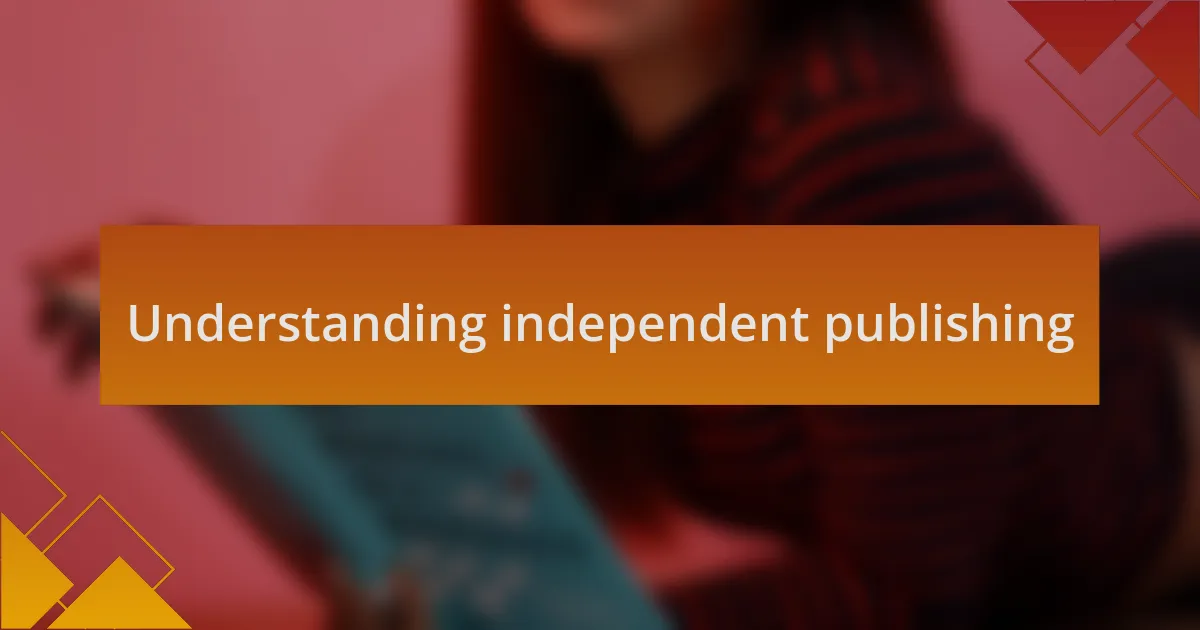
Understanding independent publishing
Independent publishing is a captivating arena where authors carve their own paths, free from traditional industry constraints. I remember the thrill I felt when I decided to publish my first book independently; it was both exhilarating and terrifying. Have you ever felt that rush when taking a leap into the unknown?
This approach not only empowers authors to maintain creative control but also offers the opportunity to directly connect with their audience. I often reflect on how refreshing it was to make decisions about my work, from cover design to pricing, without having to go through layers of approvals. Isn’t it liberating to know that your vision can come to life just the way you imagined it?
Moreover, independent publishing requires a shift in mindset; it is about embracing both the creative and entrepreneurial aspects of being an author. I learned firsthand that success isn’t just about writing a great book but also about mastering marketing and building an author brand. It raises the question: How willing are you to wear multiple hats in this journey?
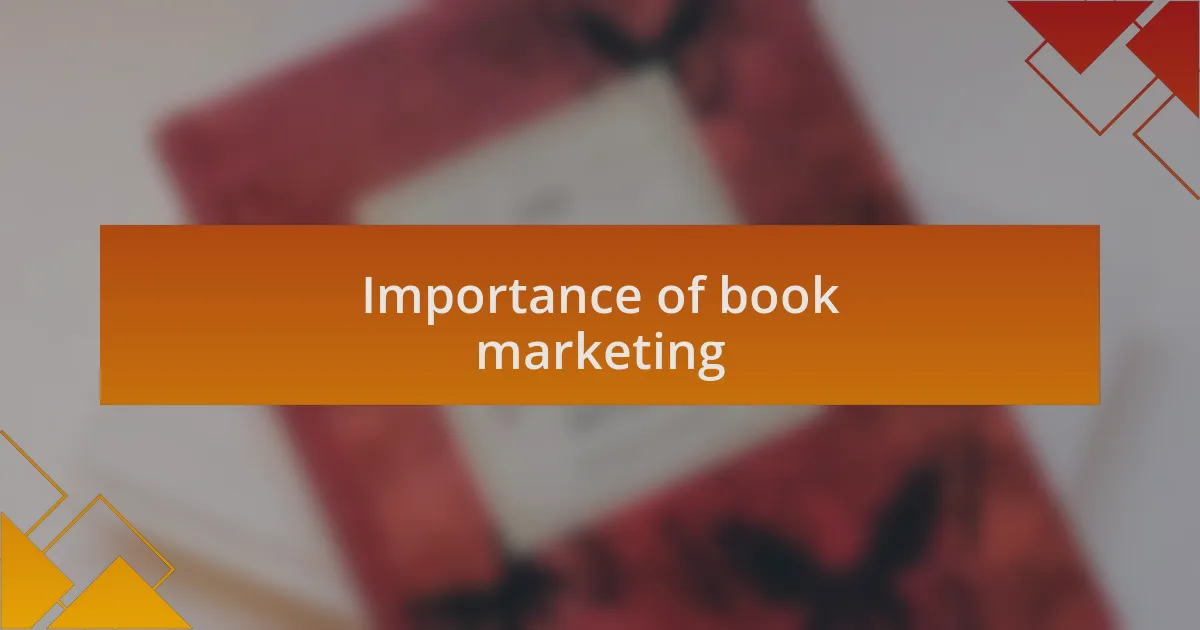
Importance of book marketing
The importance of book marketing cannot be overstated. Without effective marketing, even the most beautifully written book can fade into obscurity. I remember feeling a mix of excitement and anxiety when my first book hit the shelves. I had poured my heart into writing it, but I quickly realized that sharing it with the world required more than just creating a great story. How do you make your voice heard in a sea of countless titles?
Marketing is the lifeline that connects authors to their readers. It opens doors to conversations, relationships, and an audience eager to discover new stories. I once underestimated this aspect and thought my work would speak for itself. However, when I dedicated time to crafting a marketing strategy, I saw my readership grow. Have you ever wondered how tapping into your audience could transform your writing journey?
Ultimately, successful book marketing translates your passion into partnerships and community engagement. I still recall the joy of attending local book fairs and the connections I made with fellow authors and readers alike. Each conversation sparked new ideas and fueled my motivation. Isn’t it incredible how marketing can turn solitary writing projects into collaborative adventures?
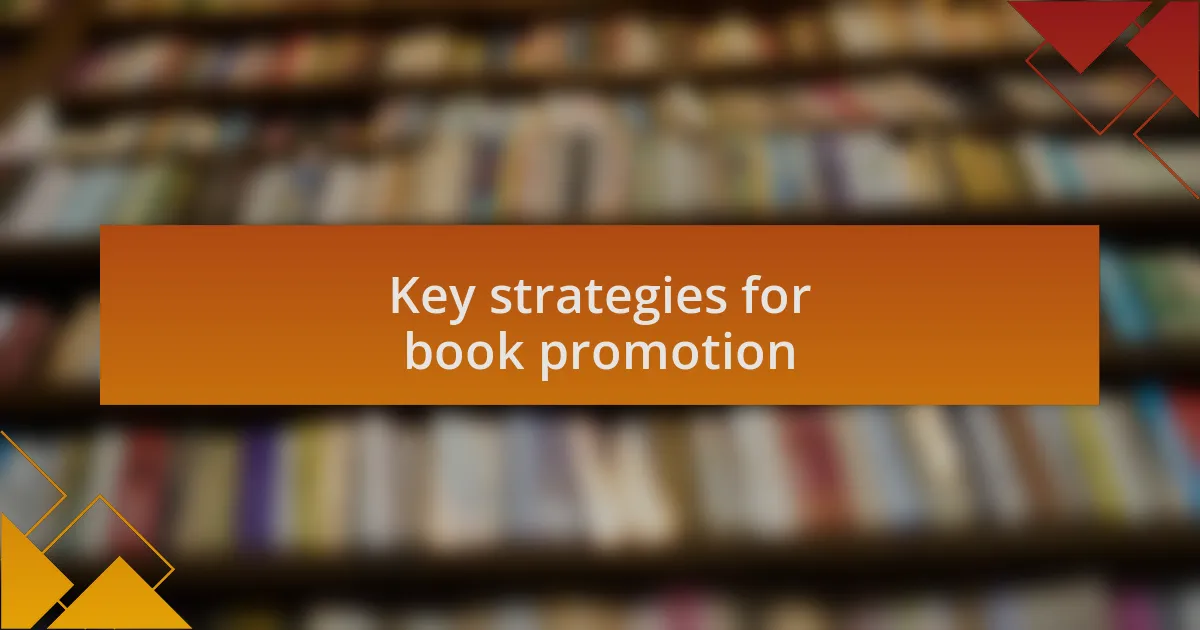
Key strategies for book promotion
When it comes to promoting your book, one of the most effective strategies I’ve found is building an online presence. I started a blog to share writing tips and insights about my journey. To my surprise, my readership grew as I connected with people who were interested in not just my work, but also my experiences. Have you thought about how sharing your story can foster community?
Social media platforms also play a crucial role in book promotion. I remember the excitement of hosting live reading sessions on Instagram. It was more than just about the book; it was about engaging with readers in real time, answering their questions, and discovering their thoughts. How do you think a genuine conversation with potential readers could change their perception of your work?
Lastly, don’t underestimate the power of collaboration. I reached out to fellow authors for joint events and marketing campaigns, and the results were remarkable. Those partnerships amplified our reach and introduced my book to new audiences. Have you explored the potential rewards of joining forces with others in the independent publishing space? It’s truly a game-changer.

Building your author brand
Building your author brand is not just about what you write; it’s about who you are as a creator. I remember starting out feeling somewhat disconnected, as if I was shouting into the void. But when I began to share my creative processes, my struggles, and the little victories, I noticed that readers responded on a deeper level. Have you considered how sharing your authentic self could draw readers closer?
Creating a cohesive visual and verbal identity is also essential for brand building. From choosing the right color palette for your book cover to crafting a consistent author bio, everything should resonate with your personal style and message. I once spent hours redesigning my website to reflect my personality better, and the feedback was overwhelmingly positive. How does your current branding align with your vision as an author?
Finally, engaging with readers directly can significantly enhance your brand. I found that hosting Q&A sessions not only gave readers a chance to understand my work but also allowed me to learn what interests them. This interaction has profoundly shaped my writing since. Have you thought about how these insights could refine your future projects?
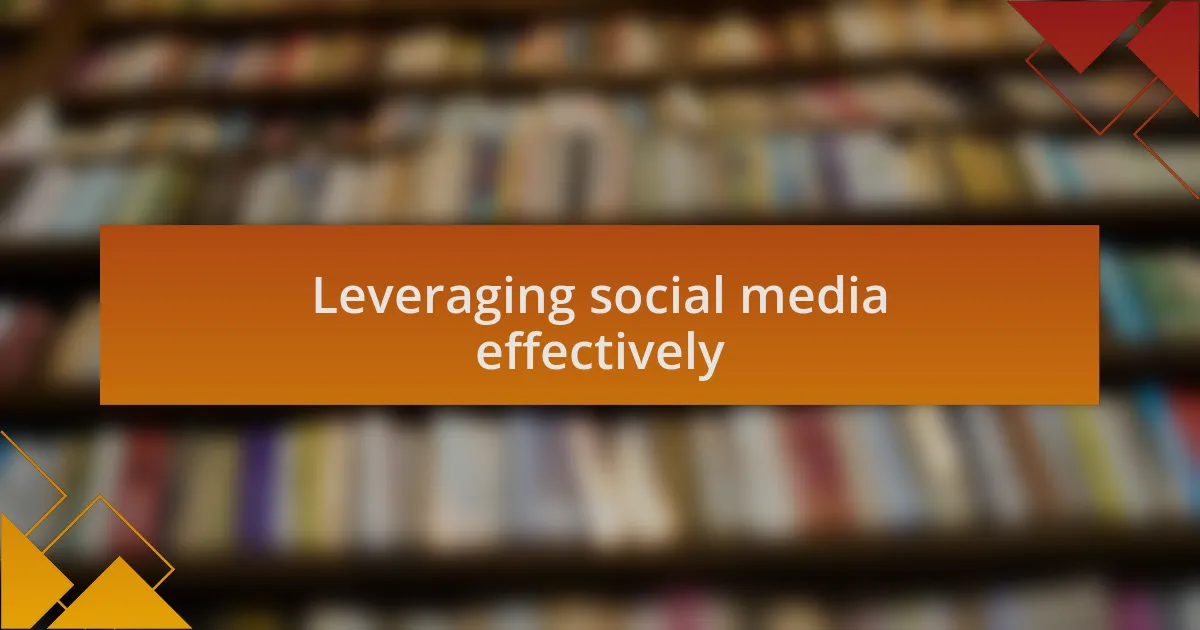
Leveraging social media effectively
Social media is a powerful tool for authors. I remember the thrill of my first Instagram post about my writing journey. Suddenly, I was receiving messages from readers who felt a connection, sharing their own stories and struggles. This reminded me that social media isn’t just about self-promotion; it’s about building a community. Have you reached out to your audience today?
In my experience, choosing the right platform matters immensely. While I initially tried to juggle multiple networks, I found it draining and ineffective. Focusing on one or two platforms where my readers were most active allowed me to engage more meaningfully. I often ask myself, am I truly connecting with my audience, or simply broadcasting my updates? Finding that balance has been key to my social media success.
Visual content plays a crucial role in capturing attention. A few months ago, I experimented with creating short videos showcasing my writing space and daily routines. The response was fantastic! People appreciate seeing the behind-the-scenes aspects of an author’s life. Are you using visuals effectively to draw readers in and give them a glimpse into your world?
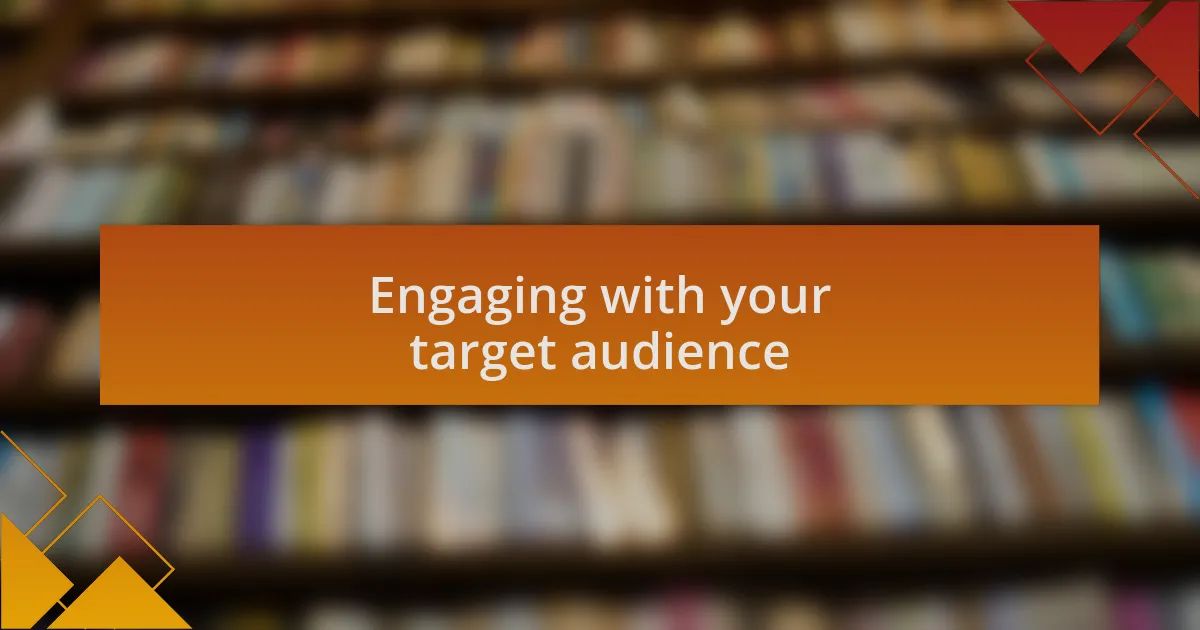
Engaging with your target audience
Engaging with your target audience begins with understanding their interests and preferences. I once organized an online Q&A session where readers could ask anything about my writing process. It was eye-opening to see what intrigued them most—their questions revealed not only what they wanted to know but also what they valued. Are you listening to what your audience is genuinely curious about, or are you just sharing your own narrative?
Creating a dialogue with readers can deepen your connection tremendously. After sending out a newsletter highlighting my latest book release, I encouraged feedback and responses. The flood of emails I received, filled with personal stories and reflections on my work, made me realize how important it is to invite interaction. Have you ever asked your readers to share their thoughts on your writing? Their insights can be invaluable and can shape your future projects.
Another effective way to engage is through personalized content. For instance, last year, I created a series of blog posts that directly addressed questions from my social media followers. This not only made them feel valued but also helped me generate content that was directly tied to their interests. Do you see your readers as collaborators in your writing journey? By involving them in your process, you can create a more inclusive and engaging experience.

My personal tips on success
One of my personal tips for success is to embrace the art of storytelling, both in your marketing and your writing. I remember vividly a time when I shared a personal story about a challenge I faced while writing my debut novel. The response was overwhelming; readers connected with my vulnerability and authenticity, which sparked deeper interest in my book. Have you considered how your own experiences can be woven into your marketing strategy?
Another key aspect is consistency. Keeping a regular schedule for content updates has proven invaluable for me. I noticed a significant uptick in engagement when I started posting weekly updates about my writing process and upcoming projects. It was like establishing a rhythm that my audience could rely on. Are you maintaining a consistent presence, or do you find yourself drifting in and out of communication with your readers?
Lastly, never underestimate the power of collaboration. I’ve teamed up with fellow authors for joint promotions and virtual events, which expanded my reach and introduced my books to entirely new audiences. The synergy created during these partnerships often leads to exciting opportunities. Have you reached out to other creatives to explore the potential of mutual support? Building a community can be a game-changer in your marketing efforts.